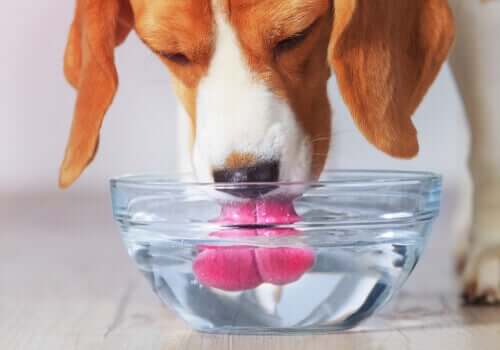What Essential Nutrients Does a Dog Need?


Written and verified by the biologist Ana Díaz Maqueda
Most pets rely on humans to feed them. In the past, these animals were able to select a wide range of foods to feed on. However, due to domestication, it seems that this quality has been lost or not maintained. Therefore, for a dog to have a long, full, and happy life, we need to know what essential nutrients it needs.
Generally, dogs need a set of nutrients, starting with water, as this transports other nutrients and helps keep dogs hydrated. In addition, they need carbohydrates, lipids and proteins, to support their structure and metabolism.
Finally, they need vitamins and minerals, which are essential for the general well-being of the animal. All these substances allow dogs to carry out vital functions.
Water is the basis of all essential nutrients for dogs

Water is not only vital to maintain hydration. In fact, when an animal is hydrated it means that the necessary reactions for synthesizing and breaking down nutrients during digestion are working. Therefore, water equals life.
It’s also important to understand that, depending on the stage of the animal’s life, (puppy, adult or senior), their water needs vary. Living beings can obtain water by drinking it directly, through food or from metabolic water. The body’s typical oxidation from chemical reactions generates the latter.
Energy in nutrition
The energy or caloric density is the amount of energy that we can find in a food unit. We usually express this as calories or kilocalories (kcal). Each type of food offers energy to animals, such as:
- 0.035 ounces of fat provide 9.4 kcal
- 0.035 ounces of protein, between 5.3 and 5.8 kcal
- and 0.035 ounces of carbohydrates, between 3.3 and 4.3 kcal
In order for the dog to stay healthy, it’s essential to avoid energy imbalance. This consists of offering the animal more or less energy than it will burn in a day. If we don’t, the dog could suffer from obesity or malnutrition.
Carbohydrates for dogs
Carbohydrates are a compound of carbon, hydrogen and oxygen. We can classify them in different ways. For example, whether they can be absorbed easily or not, whether they digest them or if they simply pass through the digestive tract, whether they ferment in the intestines, etc.
These substances are essential for the maintenance of the body and are stored as glycogen. Thus, creating glucose, which is essential for the functioning of the nervous system.
We don’t exactly know how many carbohydrates a dog needs, but we do know that these needs change with age or physiological status.
However, dogs have metabolic pathways that synthesize carbohydrates, so they don’t need to obtain it through their diet. In the wild, they’re carnivorous animals and obtain carbohydrates from the glycogen stored by their prey.
Cereals are very high in carbohydrates. These are added to pet food to reduce costs, as they aren’t necessary in a dog’s diet.

Lipids or fats in canine nutrition
Fats are an essential part of a dog’s nutrition. In addition to being the main energy reserve, they have many structural and metabolic functions in the body:
- One of its main functions is to protect nerve fibers
- Cholesterol is a type of lipid that is a forerunner for certain hormones
- They constitute lipoproteins, which help fats move in the blood
- They are the structural components of cell membranes, in the form of phospholipids and glycolipids
- Because they form part of the membrane, they’re responsible for transporting nutrients in and out of cells
Dogs obtain essential fatty acids such as omegas 6 and 3 through lipids. We still don’t know exactly how much of these nutrients a dog needs. However, we do know that they need more omega 3.
Essential nutrients for a dog: proteins
Proteins are a large molecule mainly comprised of amino acids. The functions that they carry out in the body are almost uncountable, although they can be summed up as follows:
- They form a part of antibodies
- They make room for a multitude of hormones
- They’re a fundamental part of muscles
- Collagen is made up of proteins
- They carry oxygen and carbon dioxide in the blood
- They’re essential for digestion and absorption of nutrients
- As enzymes, they have catalytic properties in metabolic reactions
- They form part of the hair, nails, tendons, ligaments and cartilage
The amount of proteins included in a dog’s diet that it can digest and absorb depends on their biological value. Therefore, while dog food may be rich in protein, the dog may not be able to absorb any.
Vitamins and minerals
Dogs only require vitamins in small amounts, and having little to no vitamins can hugely affect the body. This is because they have very specific structural or metabolic functions.
There are fat-soluble vitamins that the body absorbs and stores, mainly, in the liver. These are vitamins A, D, E, and K. On the other hand, there are the water-soluble vitamins. The body absorbs these rapidly and excretes them through urine. This is the case for vitamins B and C.
Finally, we have minerals or mineral salts. A set of essential inorganic elements for the nutritional needs of a dog and are calcium, magnesium, sulfur, iron, copper, zinc, manganese, iodine, selenium, cobalt, sodium, potassium and phosphorus.
Most pets rely on humans to feed them. In the past, these animals were able to select a wide range of foods to feed on. However, due to domestication, it seems that this quality has been lost or not maintained. Therefore, for a dog to have a long, full, and happy life, we need to know what essential nutrients it needs.
Generally, dogs need a set of nutrients, starting with water, as this transports other nutrients and helps keep dogs hydrated. In addition, they need carbohydrates, lipids and proteins, to support their structure and metabolism.
Finally, they need vitamins and minerals, which are essential for the general well-being of the animal. All these substances allow dogs to carry out vital functions.
Water is the basis of all essential nutrients for dogs

Water is not only vital to maintain hydration. In fact, when an animal is hydrated it means that the necessary reactions for synthesizing and breaking down nutrients during digestion are working. Therefore, water equals life.
It’s also important to understand that, depending on the stage of the animal’s life, (puppy, adult or senior), their water needs vary. Living beings can obtain water by drinking it directly, through food or from metabolic water. The body’s typical oxidation from chemical reactions generates the latter.
Energy in nutrition
The energy or caloric density is the amount of energy that we can find in a food unit. We usually express this as calories or kilocalories (kcal). Each type of food offers energy to animals, such as:
- 0.035 ounces of fat provide 9.4 kcal
- 0.035 ounces of protein, between 5.3 and 5.8 kcal
- and 0.035 ounces of carbohydrates, between 3.3 and 4.3 kcal
In order for the dog to stay healthy, it’s essential to avoid energy imbalance. This consists of offering the animal more or less energy than it will burn in a day. If we don’t, the dog could suffer from obesity or malnutrition.
Carbohydrates for dogs
Carbohydrates are a compound of carbon, hydrogen and oxygen. We can classify them in different ways. For example, whether they can be absorbed easily or not, whether they digest them or if they simply pass through the digestive tract, whether they ferment in the intestines, etc.
These substances are essential for the maintenance of the body and are stored as glycogen. Thus, creating glucose, which is essential for the functioning of the nervous system.
We don’t exactly know how many carbohydrates a dog needs, but we do know that these needs change with age or physiological status.
However, dogs have metabolic pathways that synthesize carbohydrates, so they don’t need to obtain it through their diet. In the wild, they’re carnivorous animals and obtain carbohydrates from the glycogen stored by their prey.
Cereals are very high in carbohydrates. These are added to pet food to reduce costs, as they aren’t necessary in a dog’s diet.

Lipids or fats in canine nutrition
Fats are an essential part of a dog’s nutrition. In addition to being the main energy reserve, they have many structural and metabolic functions in the body:
- One of its main functions is to protect nerve fibers
- Cholesterol is a type of lipid that is a forerunner for certain hormones
- They constitute lipoproteins, which help fats move in the blood
- They are the structural components of cell membranes, in the form of phospholipids and glycolipids
- Because they form part of the membrane, they’re responsible for transporting nutrients in and out of cells
Dogs obtain essential fatty acids such as omegas 6 and 3 through lipids. We still don’t know exactly how much of these nutrients a dog needs. However, we do know that they need more omega 3.
Essential nutrients for a dog: proteins
Proteins are a large molecule mainly comprised of amino acids. The functions that they carry out in the body are almost uncountable, although they can be summed up as follows:
- They form a part of antibodies
- They make room for a multitude of hormones
- They’re a fundamental part of muscles
- Collagen is made up of proteins
- They carry oxygen and carbon dioxide in the blood
- They’re essential for digestion and absorption of nutrients
- As enzymes, they have catalytic properties in metabolic reactions
- They form part of the hair, nails, tendons, ligaments and cartilage
The amount of proteins included in a dog’s diet that it can digest and absorb depends on their biological value. Therefore, while dog food may be rich in protein, the dog may not be able to absorb any.
Vitamins and minerals
Dogs only require vitamins in small amounts, and having little to no vitamins can hugely affect the body. This is because they have very specific structural or metabolic functions.
There are fat-soluble vitamins that the body absorbs and stores, mainly, in the liver. These are vitamins A, D, E, and K. On the other hand, there are the water-soluble vitamins. The body absorbs these rapidly and excretes them through urine. This is the case for vitamins B and C.
Finally, we have minerals or mineral salts. A set of essential inorganic elements for the nutritional needs of a dog and are calcium, magnesium, sulfur, iron, copper, zinc, manganese, iodine, selenium, cobalt, sodium, potassium and phosphorus.
All cited sources were thoroughly reviewed by our team to ensure their quality, reliability, currency, and validity. The bibliography of this article was considered reliable and of academic or scientific accuracy.
- Freeman, L., Becvarova, I., Cave, N., Mac-Kay, C., Nguyen, P., Rama, B., & Yathiraj, S. (2011). Guía para la evaluación Nutricional. Clínica veterinaria de pequeños animales: revista oficial de AVEPA, Asociación Veterinaria Española de Especialistas en Pequeños Animales, 31(2).
- Hirakawa, C., & Daristotle, C. (2001). Nutrición Canina y Felina.
- Risso, A. L. (2016). Conceptos Básicos de Nutrición en perros y gatos.
- Bontempo, V. (2005). Nutrition and health of dogs and cats: evolution of petfood. Veterinary research communications, 29(2), 45-50.
- National Academy of Sciences US. (2006). YOUR DOG’S NUTRITIONAL NEEDS. A Science-Based Guide For Pet Owners. National Academies Press.
This text is provided for informational purposes only and does not replace consultation with a professional. If in doubt, consult your specialist.








